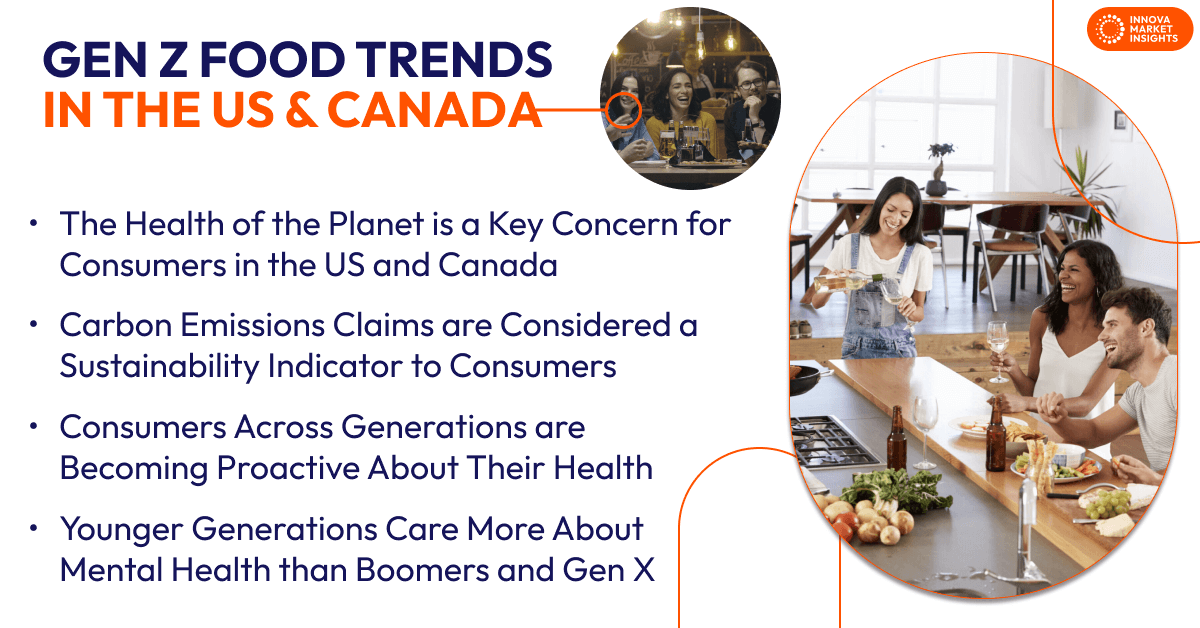August 30, 2024 – In today’s dynamic world, understanding consumer values and preferences is crucial for businesses to thrive. Here we will provide valuable insights into the evolving landscape of US and Canadian consumers across different generations, highlighting their key concerns and aspirations. We’ll explore the impact of global megatrends on consumer behavior, including health and wellness, and sustainability. We’ll also delve into generational differences in attitudes towards sustainability, and mental and physical health, and how these differences impact their purchasing decisions.
Gen Z Food Trends: Sustainability Habits
52% of consumers in the US and Canada agree that they feel good about the planet when buying sustainable food and beverages. Additionally, Gen Z food trend research demonstrates that consumers of this demographic are particularly interested in protecting the environment; 34% state that they are concerned about the health of the planet.
The top global issues for consumers differ based on generation, but sustainability-based concerns are consistently top of mind – particularly concerning plastic and food waste. For Generation Z, plastic and food waste is the #1 and #4 concern, respectively.
Gen Z food trend research shows that waste management is now becoming more of a collective action. 35% of Gen Z say that in the past year, they have minimized food waste to be more environmentally responsible in their food choices. Additionally, 24% of Gen Z say that they would like to see companies improving waste management to help environmental and social causes.
Generally, sustainability is a more important driver for food and beverage development to younger generations. Gen Z food trends show that 22% of Gen Z consumers believe that sustainability should drive development of new products.

Millennials Food Trends: Sustainability Habits
Compared to Gen Z, Millennials are slightly less concerned about the health of the planet. 30% of Millennials state that they are concerned about the health of the planet, compared to Gen Z’s 34%.
Regarding the top sustainability-based global issues for this demographic, for Millennials food waste is the top concern, while plastic waste is the third.
In waste management, Millennials are just as active as Gen Z. 35% of Millennials say that in the past year, they have minimized food waste to be more environmentally responsible in their food choices. Additionally, in statistics similar to Gen Z, 24% of Millennials say that they would like to see companies improving waste management to help environmental and social causes.
Finally, 21% of Millennials believe that sustainability should drive development of new products.
Generation X Food Trends: Sustainability Habits
Generation X are similar to Millennials in their concern over planetary health. 30% of the generation say that they are concerned about the health of the planet.
With regards to the top sustainability-based global issues for Gen X consumers, plastic waste is #2, and food waste is #3.
Gen X is especially cognizant of waste management as a method of sustainability; more so than Gen Z and Millennials. 50% of Gen X consumers say that in the past year, they have minimized food waste to be more environmentally responsible in my food choices. 30% would also like to see companies improving waste management to help environmental and social causes.
Lastly, 22% of Gen X consumers believe that sustainability should drive new development of products.
Boomers Food Trends: Sustainability Habits
Boomers, like Gen Z, are highly concerned about the environment. 34% state that they are concerned about the health of the planet.
The top global sustainability-based issues for Boomers is plastic waste at the top, and food waste as the second most important.
Boomers, like Gen X, are focused on minimizing food waste as an action towards sustainability; 50% of the demographic say that they have minimized food waste to be more environmentally responsible in their food choices. 30% of Boomers also would like to see companies improving waste management to help environmental and social causes.
Boomers are less interested in sustainability as a driver for food and beverage development, stated as important by only 14% of consumers in the generation.
A Focus on Sustainability Claims
35% of consumers in the US and Canada state that they always pay attention to sustainability claims on packaging. This trend is mainly driven by Gen Z and Millennials.
Carbon emission claims are becoming a key sustainability indicator for consumers. 47% agree that carbon emissions associated with a product are the most important factor to determine how sustainable a product is. Gen Z food trend research also shows that the generation is more influenced by carbon-related claims when purchasing food and beverage products.
Generational Approaches to Mental Health
Proactive attitudes towards health issues have become a norm across all generations. 64% of consumers in the US and Canada state that they try to prevent health conditions by living healthily. Boomers are most likely to make proactive actions to live healthily compared to younger generations.
Consumers are increasingly considering mental health as a part of their holistic health. For instance, mental wellbeing is the top aspect consumers consider as a part of holistic health, followed by physical wellbeing and emotional wellbeing.
Stress and anxiety are major mental health concerns for consumers across all generations. Younger generations are more concerned about stress and anxiety compared to older generations. Additionally, they tend to be more proactive when it comes to mental health issues. 56% of Millennials and Gen Z consumers state that they have taken action to maintain their mood improvement in the past year, compared to 46% of Boomers and Gen X. Additionally, 50% of Millennials and Gen Z say that they have taken action to mitigate depression over the past year, compared to 39% of Boomers and Gen X.
Food and Beverage for Mood Improvement
47% of consumers in the US and Canada agree that they turn to food and beverage as a primary way of improving health. Additionally, 22% of Boomer consumers state that a food or beverage with brain health functions is most desirable to them.
Younger consumers pay more attention to de-stressing and mood improvement functions in food and beverage compared to older consumers. 25% of Gen Z, and 24% of Millennials have purchased food or beverages to de-stress over the past year, compared to 20% of Gen X and 14% of Boomers.
What’s Next in Gen Z Food Trends and Beyond?
Different generations have varied expectations for brands’ actions towards environmental and social causes. Generation Z places more emphasis on respecting human rights, and nature protection. Millennials care more about sustainable packaging and reducing carbon footprints. Both Generation X and Boomers focus on sustainable packaging and waste reduction and management. Brands can therefore tailor their environmental and social actions towards their preferred market of consumers.
Simplicity and straightforwardness in sustainability-based messaging is highly important for consumers in the US and Canada. 36% say that they would like to see simplified sustainability information on their products, and 61% say that they would like to see straightforward communication about companies’ efforts in sustainability on packs. Investing into direct messaging can thus allow brands to appeal to all generations across the US and Canada.
Finally, different generations have different health concerns, creating opportunities for different health-focused products to appeal to specific generations of consumers. Gen Z focus most on weight management and skin health, Millennials and Gen X focus on weight management and heart health, and Boomers focus on healthy aging and weight management.
This article is based on Innova’s Values & Preferences Across Generations in the US & Canada report. This report is available to purchase or with an Innova Reports subscription. Reach out to find out more

